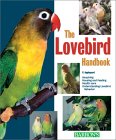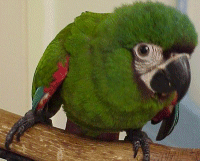I Thought This Bird Was Hand Fed
The Importance of Socializing Baby Birds
One of the most common complaints I hear is about hand-fed birds that they are not as tame as the owner expects them to be. Many people assume hand-fed means tame, but this is not necessarily the case. There are a number of very important factors that determine the tameness of a bird.
Socializing
If a breeder simply fills a bird up with formula a few times a day then plops it back in the brooder, they will not be properly socialized. However, such birds are usually somewhat comfortable with human handling and can be tamed with proper techniques. First and foremost I tell people to buy a bird that is already quite tame. Obviously a baby might be a bit nervous around you because you are a stranger, but it should not be utterly terrified, biting, and trying desperately to get away from even the person selling him to you. Socializing is an essential part of raising baby parrots. Can you imagine what human children would be like if we just gave them a bottle many times a day, but never handled them between feedings and never interacted with them? We actually know what happens to such children: they develop what is called an attachment disorder. They have difficulty making bonds with other human beings and often exhibit antisocial behaviors as teenagers and adults.
Birds are flock creatures. They need to be part of a group. Their instinct to bond with another being is an essential part of their psychological makeup. Many behaviorists now believe that the emerging issues with unmanageable, destructive pet birds are due to poor socialization techniques during the first few months of life. Research your source before buying a bird. Question them about how they socialize the bird. If they don’t know what you mean by socialize, it is better to look elsewhere.
One of the most important times to handle a baby bird is BETWEEN feedings. This gets the baby used to human hands and teaches it about social interaction. The simplest thing to call this time is playtime. Play is as essential to baby birds as it is to baby humans. I know that baby lovebirds crave attention. When you walk into the nursery, they crowd up to the door begging for your to handle them. Ignoring this need does not make for happy, well-adjusted adult birds.
Timid Birds
Some baby birds are a bit more timid than others. I have noticed dramatic differences in the personality of my birds even within the same clutch. Some need a little more coaxing, a little more stroking and handling, to come out of their shell so to speak. I always make a point of taking these timid birds out by themselves and handling them away from their siblings. They become more secure after only a few days of this type of isolated playtime.
A New Bird in the Home
Don’t mistake a nervous newcomer for an untamed bird. Imagine what it is like to come into a new home, away from all your siblings, in a new cage with strange new toys. It can be very frightening to a baby bird. There is an adjustment period, and you need to respect this bird’s need to reorient itself to the new environment and new flock members (you and your family). It is best not to overstimulate the bird during this period. It is stimulated enough by the change. Handle him during quiet times when you are sitting and there is little activity in the home. Don’t start walking all over the house with him on your shoulder or keeping him out of the cage for long periods. Make sure the bird knows where his food and water bowls are. Talk to him gently and calmly, and move slowly. When you hold him, sit and stroke his head. Don’t make sudden movements or get up suddenly. Tell him what you are doing as you do it: verbal interaction is always an important part of your relationship with your pet bird. I don’t agree that the bird should not be handled for a few days, and in fact, I think this is a mistake. Simply handle your new pet with care and understanding. Return him to his cage after about fifteen minutes so he can eat and relax, then play with him again a little later.
The Bad Seed
You do occasionally hear about a bird that just doesn’t want to be handled and is miserable when you try to tame him. Are there birds that just aren’t appropriate as pets? I tend to think there may be. However, the cause is not clear. It could be basic genetics or it could be very poor socialization techniques on the part of the breeder or handfeeder. However, even extremely aggressive, wild-caught amazons have been tamed into loving pets. It does seem that proper handling can work with many birds. If you are having an issue, it may be time to look for outside help. There are many avian behaviorists willing to come to your home and help you work with your bird.










